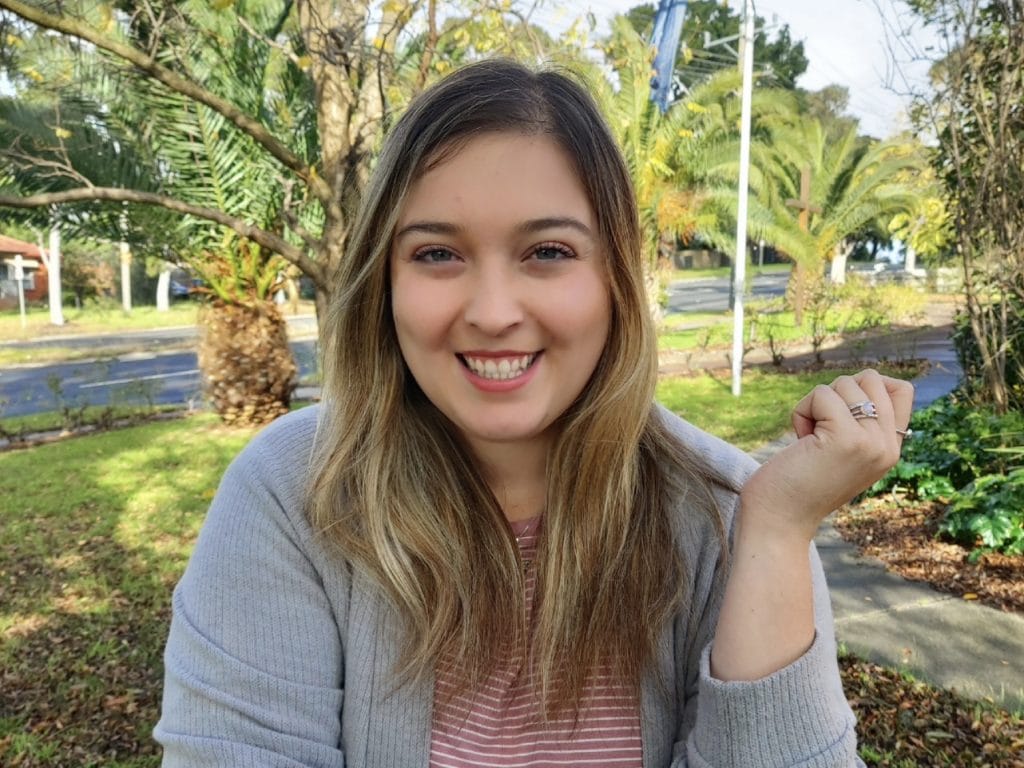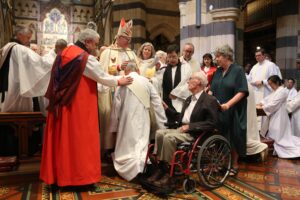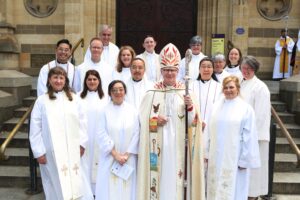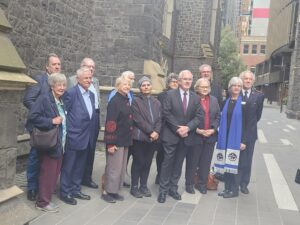
Jenan Taylor
9 June 2022
The Reverend Breannon Wilkinson thought being a youth pastor was what she most wanted from life. Then she learned to plant.
Ms Wilkinson is a church planter for Sent Collective, and assistant curate at St Philip’s Mount Waverley, a partner church to the planting initiative.
Sent Collective takes a micro churches approach to seeding disciples.
Describing it, Ms Wilkinson asks people to picture a dandelion. The gathered worship is the centre of the sun yellow petals she explains, and the wispy seeds are the small micro churches.
Some of the things the micro churches are involved in include engaging people over meals in pubs and restaurants and connecting with theatre students.
At St Philip’s, the initiative is there to help the older congregation think about how they can reach out to the local community and be more relevant to it, she said.
For Ms Wilkinson, that means helping the church to engage with all the issues the broader community faces.
She believes the biggest one is how to be an ally to First Nation’s people and how to model that for other churches.
It’s the reason why all gatherings at St Philip’s start with an acknowledgement to country, Ms Wilkinson said.
“Every service involves praying for Indigenous populations and, reminding parishioners that they need to continue to educate themselves about Indigenous issues. They’re two things that Christians can do without relying on Indigenous people to teach us,” she said.
The church also celebrates Reconciliation and NAIDOC weeks and are consulting with local Indigenous leaders about what other steps they need to take.
“It means thinking about what native plants we should use in our gardens. How we shape our land, how we are to hold culture and creatures together, and all the little things that we can do to say, ‘hey, we stand with you in this’,” she said.
Read more: The asylum seeker who found God in the darkness
Even though Ms Wilkinson’s ardour for planting extends well beyond the walled garden that sits behind St Philip’s pulpit, it’s not what she thought she would be doing.
“If you’d asked me seven years ago, I would have said, I’m just going to be a youth pastor forever. That’s what I was passionate about,” she said.
Having started out at Hillsong Melbourne, Ms Wilkinson said her worldview tended to be individualistic. “It was more this is just me and Jesus time and forget the rest,” she said.
What attracted her to the Anglican tradition was joining the Glen Waverley Anglican church and studying at Bible college.
Through that, she leaned towards the Anglican way of shared meals and celebrating Jesus’ death, resurrection and forgiveness. What she was most affected by was the tradition of the Lord’s Supper being a “sacred communal space”.
Ms Wilkinson said it resonated with the work she was doing with university students, which was about fellowship around shared meals.
But she recognised that some people in the group would never ever step into a traditional church building, and she wondered what kind of worship format they would prefer and what it would be like to be a priest for such a group.
“I wrestled with the question of ‘What does it look like to be contextually and culturally relevant as the Church’, just because the next generation is hugely unchurched,” she said in concluding that it necessitated making changes.
At the same time Sent Collective was trying to discern what they were doing, who they were trying to reach and indeed whether or not to go ahead, she said.
All that together brought her to the realisation that becoming a priest was what God was calling her to do, and she was ordained in late 2021.
Ms Wilkinson said it seemed to come as no surprise to friends and colleagues because she’d often been told that she had a flair for conversation and evangelism.
Nonetheless, Ms Wilkinson believes it was the time she had spent as a planter in deep conversations in her local area, particularly at the Nottingham Neighbourhood House, that has really given her the scope to practice her talent.
Talking to people in the community has in itself been a learning curve, she said.
As church leader at the neighbourhood house, for example, it was easy to assume that where there are university students there would be a need for food, she said. But that’s exactly where it was easy to fall short.
It transpired that when asked, the neighbourhood house staff told her that connection and food was what was most important to students.
It was especially true for those international students who were here on bridging or work visas and were really struggling, Ms Wilkinson said.
It gave Sent Collective the information to think deeper about how to really help those students and within that, get access to food. “But you only hear those stories when you have conversations with people,” she said.
Read more: The accidental pastor bringing a passion for the gospel to Greensborough
The closer engagements also helped her to better understand some of the typical living arrangements of the large multicultural community in the area, and what connection looks like for them. These include households where elderly grandparents, their adult children and grandchildren all live together.
It also brought insights into the high rates of domestic violence that do occur in some of them, she said.
As a master’s degree graduate from Ridley college, Ms Wilkinson has shelved any further formal study for the time being but immerses herself in as much literature as she can find about Australia’s Indigenous people.
It includes finding out where God’s story fits into their story, and how to decolonise scripture, she said.
And then there’s the question of truth.
“You have your truth; I have my truth. So, what does truth look like in our society today, because it’s more blurred than it’s ever been,” Ms Wilkinson said. “For me and for our church, our big heart is that all these conversations are done in deep relationship in authentic community.”
She cites the neighbourhood house as a place where lots of widely varying views happen often, and from where it’s possible to have a learning and a listening posture as Christians.
“Because we’re not in deep relationship with some people there, it’s not really a place where we want to kind of jump on the offensive side, but rather, let’s sit and listen. I think we can learn from anyone and everyone, not just people in our church community,” Ms Wilkinson said.
“For someone who is part of our community, we would sit with them and try to unpack where some [of their views] come from. I’d be interested to hear how they got there, how much it differed from what I thought, and to be able to share each other’s story.”
Ms Wilkinson hopes that the Anglican Church will be spread further through lots of smaller churches in the foreseeable future.
She believes it will happen, particularly through the format of people talking about the Bible over a meal and drinks at the pub.
Despite her devotion to planting though, Ms Wilkinson said she’d always have a tender spot for working with youths and especially high school students.
“The way that they interpret the world and talk about things, it’s fascinating. I learn so much about the world that they’re being raised in and therefore the culture of the next generation of leaders and disciples,” she said.
“It’s constantly teaching me to be humble and to learn from everyone, not just those older than me or who seem wiser. But yeah, I am pleasantly surprised by who God uses to encourage and teach me things.”
This profile of the Reverend Breannon Wilkinson is part of a series on women in ministry, marking the December 2022 anniversary of 30 years since women were ordained in the Anglican Diocese of Melbourne.
For more faith news, follow The Melbourne Anglican on Facebook, Twitter, or subscribe to our weekly emails.







